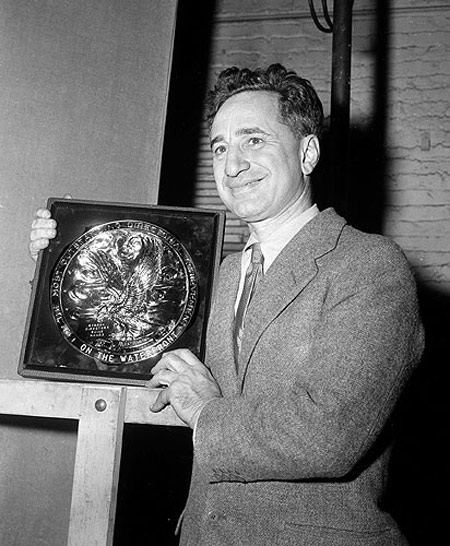
Elia Kazan accepts his 1954 DGA Award for Feature Director
Legendary director Elia Kazan died in September, leaving behind a legacy of work that ensured his place among the greatest directors in film history. Brilliant and controversial, Kazan explored multiple facets of human nature in such films as A Tree Grows in Brooklyn (1945), Gentleman's Agreement (1947), A Streetcar Named Desire (1951), On the Waterfront (1954, for which he won the DGA Feature Directing Award), East of Eden (1957), A Face in the Crowd (1957), Splendor in the Grass (1961) and his most personal film, America, America (1963) where he told the story of his Greek uncle's coming to America.
After accepting his 1954 DGA Award for Feature Director, Kazan said, "The DGA is the best organization I ever belonged to. I think it's a stand-up, strong organization. It fights for the rights of the director."
What follows are quotes from Kazan and others about his work, and his lasting influence on the art of filmmaking.
"Every director, even in those rare instances when he doesn't work with a writer or two — Fellini works with a squadron — must take responsibility for the screenplay. He has not only to guide rewriting but to eliminate what's unnecessary, cover faults, appreciate nonverbal possibilities, ensure correct structure, have a sense of screen time, how much will elapse, in what places, for what purposes. Robert Frost's 'Tell Everything a Little Faster' applies to all expositional parts. In the climaxes, time is unrealistically extended, 'stretched,' usually by close-ups.
"The film director knows that beneath the surface of his screenplay there is a subtext, a calendar of intentions and feelings and inner events. What appears to be happening, he soon learns, is rarely what is happening. This subtext is one of the film director's most valuable tools. It is what he directs. You will rarely see a veteran director holding a script as he works, or even looking at it. Beginners, yes."
–Elia Kazan,
1973, Wesleyan University lecture
"Elia Kazan was simply one of the best and most enduring filmmakers of all time. The fact that he was regarded so by his professional colleagues is significant, but it is the millions of movie-goers who continue to be affected by his films that tells the real story about this remarkable director. Movies like On the Waterfront, for which he won the DGA Award for Theatrical Direction in 1954, not only entertained and mesmerized us but examined humankind from the inside out.
"But it was not only his filmic achievements for which he should be remembered; as a longtime Board Member of the Guild he recognized that in addition to negotiating for the economic and working rights of directors, that the cultural side of film and filmmaking should be a high priority in the Guild's activities and co-founded the DGA Special Projects department to recognize and remember the artistic achievements of directors.
"Presented the DGA Lifetime Achievement Award in 1987 for distinguished achievement in motion picture direction, his significant contributions to the craft of directing have influenced filmmakers of each generation during his long and prolific life — and will continue to do so even in his death."
–Michael Apted
President, Directors Guild of America
"Elia Kazan was my first teacher in movies, an indispensable mentor of me; inspiring, generous, unpretentious, preeminent in both the legitimate theater and the movies during a chaotic clash of culture and politics in America."
–Warren Beatty, director
Los Angeles Times
"Special Projects was Elia Kazan's concept. He thought the Guild should be interested in more than just the all-important matter of getting the best contracts, deals and working conditions. He and I talked and we agreed that there are other aspects to our lives, the cultural side of film and filmmaking should be given a spot in the Guild's activities. It was his concept. I got it started out here on the West Coast and we eventually got the East Coast branch as well."
–Robert Wise
DGA Past President and co-founder DGA Special Projects